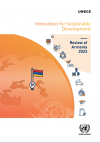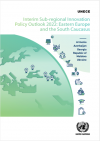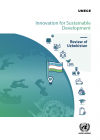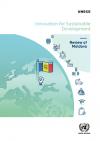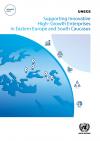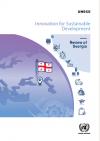Innovation and Competitiveness Policies (ICP)
Introduction

Innovation is central to achieving the 2030 Agenda for Sustainable Development and one of the main enablers not only to prosperity but also to inclusive and sustainable development.
With the Fourth Industrial revolution, digital transformation and technological advancement have brought growth, higher productivity, higher output per person, and increased quality of life. Connectivity and digitization have created new opportunities – they have empowered citizens, transformed work, created new business models and accelerated innovation. Governments have thus a central role to play in ensuring that innovation-driven growth will be inclusive and sustainable and in harnessing the power of innovation for sustainable development.
Under this work stream UNECE supports member States in their efforts to enable and promote innovation for sustainable development and develop vibrant innovation systems in a range of policy areas, such as risk finance, entrepreneurship development, innovation governance, science-industry linkages, innovation-enhancing procurement, innovation for the circular economy transition, and diaspora engagement.
Under this mandate, UNECE supports member States through intergovernmental meetings and multi-stakeholder meetings, facilitating knowledge sharing and exchange of best practices and identifying policy actions and recommendations in thematic areas, through the work of its Team of Specialists on Innovation and Competitiveness Policies (ToS-ICP).
UNECE also provides country and regional assessments and policy studies through its flagship publications, the Innovation for Sustainable Development Reviews (I4SDR) and the sub-regional Innovation Policy Outlook (IPO), as well as policy handbooks and thematic publications.
To support member States in their efforts to put policy guidance and recommendations into practice, UNECE provides national and regional capacity building, including trainings, on-line resources, and policy handbooks on specific topics.
In focus
Highlights
- The 5th session of the Working Party on Public-Private Partnerships held on 29-30 November in Geneva, Switzerland
- The 13th session of UNECE Team of Specialists on Innovation and Competitiveness held on 1-2 November in Geneva, Switzerland
- Second Session of the SPECA Working Group on Innovation and Technology for Sustainable Development and Sub-regional SPECA workshop on Innovation for Sustainable Development held on 20 October in Bishkek, Kyrgyzstan
- The 5th UNECE International Public-Private Partnerships Forum held on 22-26 April in Geneva, Switzerland
- Explore our handbook on “Business incubators for sustainable development in the SPECA subregion” which covers the key steps and considerations to set up, run, and evaluate business incubation programmes
- Learn more about how policymakers in the EESC subregion can design effective policies and institutions to enable and foster the potential of innovative, high-growth entrepreneurship as invaluable drivers for innovation-led sustainable development
- Launch of the Sub-regional Innovation Policy Outlook 2020: Eastern Europe and South Caucasus (IPO)
Upcoming Events
EIT (European Institute of Innovation and Technology)
Brussels
Belgium
Recent Events
Room V, Palais des Nations Geneva Switzerland
Palais des Nations, Room XXVI Geneva Switzerland
Tblisi Georgia




